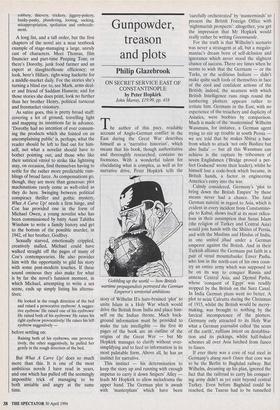Gunpowder, treason and plots
Philip Glazebrook
ON SECRET SERVICE EAST OF CONSTANTINOPLE by Peter Hopkirk John Murray, £19.99, pp. 418 The author of this pacy, readable account of Anglo-German conflict in the East during the Great War describes himself as a 'narrative historian', which means that his book, though authoritative and thoroughly researched, contains no footnotes. With a wonderful talent for elucidating what is complex, as well as for narrative drive, Peter Hopkirk tells the -- Gobbling up the world — how British wartime propagandists portrayed the German Emperor's territorial ambitions story of Wilhelm II's hare-brained 'plot' to unite Islam in a Holy War which would drive the British from India and place him- self on the Indian throne. Much back- ground information must be provided to make the tale intelligible — the first 40 pages of the book are an outline of the origins of the Great War — but Mr Hopkirk manages to clarify without over- simplifying and to feed us information in its most palatable form. Above all, he has an instinct for narrative.
This instinct — his determination to keep the story up and running with enough impetus to carry it down Snipers' Alley — leads Mr Hopkirk to allow melodrama the upper hand. The German plot is awash with `masterplans' which have been 'carefully orchestrated' by 'masterminds' to present the British Foreign Office with 'nightmarish prospects': altogether, you get the impression that Mr Hopkirk would really rather be writing Greenmantle.
For the truth is that Wilhelm's scenario was never a stratagem at all, but a megalo- maniac's dream born of self-delusion and ignorance which never stood the slightest chance of success. There are times when he seems to wish that the Germans — or the Turks, or the seditious Indians — didn't make quite such fools of themselves in face of the cool and confident actions of the British; indeed, the neatness with which British Intelligence runs rings round the lumbering plotters appears rather to irritate him. Germans in the East, with no experience of the treachery and duplicity of Asiatics, were boobies by comparison. Much is made of the 'mastermind' Wilhelm Wassmuss, for instance, a German agent trying to stir up trouble in south Persia — we are told that he makes Shiraz a base from which to attack 'not only Bushire but also India' — but all this Wassmuss can achieve is the capture by tribesmen of seven Englishmen ('Bridge proved a per- fect Godsend' wrote their leader), whilst he himself lost a code-book which became, in British hands, a factor in engineering America's entry into the war.
Calmly considered, Germany's 'plot to bring down the British Empire' by these means never had a chance. The fatal German naivete in regard to Asia, which is evident in every incident from Constantino- ple to Kabul, shows itself at its most ridicu- lous in their assumption that Sunni Islam (the religion of Turkey and Central Asia) would join hands with the Shiites of Persia, and with the Muslims and Hindus of India, in one united jihad under a German emperor against the British. And in their Turkish alliance the Germans put faith in a pair of venal mountebanks: Enver Pasha, who lost in the north-east of his own coun- try an entire army which was supposed to be on its way to conquer Russia and annexe Central Asia; and Djemal Pasha, whose 'conquest of Egypt' was readily stopped by the British on the Suez Canal. In India German plans went no better. A plot to seize Calcutta during the Christmas of 1915, whilst the British would be merry- making, was brought to nothing by the farcical incompetence of the plotters. Germany only attracted to its Holy War what a German journalist called 'the scum of the earth', ruffians intent on destablisa- tion and its pickings, whilst half-baked schemes all over Asia lurched from fiasco to fiasco.
If ever there was a core of real steel in Germany's drang nach Osten that core was to be the Berlin to Baghdad railway. But Wilhelm, dreaming up his plan, ignored the fact that the railroad to carry his conquer- ing army didn't as yet exist beyond central Turkey. Even before Baghdad could be reached, the Taurus had to be tunnelled through. Never mind: he despatched his army — a handful of soldiers led by two quarrelsome officers and two seditious Indians — who were to carry the jihad to the Emir of Afghanistan, raising Persia to their banner as they passed through. To reach Kabul through Persia's deserts with half the original force was a considerable feat; once there they became virtual prison- ers of the Emir, helpless for 10 months, until His Highness decided to retain his English pension, and expelled them. In the figure of one of these German officers, Captain Niedermayer, who was obliged to beg his way back to Europe, may be seen the conclusion of the drang nach Osten. Mr Hopkirk's last book, The Great Game, is the story of one emperor's ambitions (Peter the Great's 'will', conjuring his successors to seize India and Constantinople), and this book, too, tells the story of an emperor's failed ambition. Both schemes foundered amid characters and circumstances, heroic or ludicrous, into which Mr Hopkirk injects colour and life. But Wilhelrn's crazy plot was never quite 'the great game'; indeed, one British officer categorised it rather nicely when he likened the search for Niedermayer in Persia to 'the exciting game of hunt the slipper — with the odds very much in favour of the slipper'.



























































 Previous page
Previous page